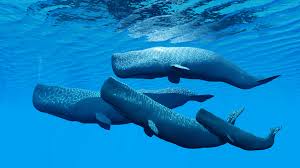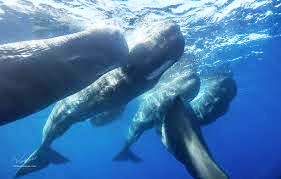Whale of a conversation
Sperm whales are fascinating creatures. They possess the biggest brain of any species, six times larger than a human’s. Scientists believe may have evolved to support intelligent, rational behavior. They’re highly social, capable of making decisions as a group, and they exhibit complex foraging behavior. A new analysis of years of vocalizations by sperm whales in the eastern Caribbean has found that their system of communication is more sophisticated than previously known. The various species of whales inhabiting Earth’s oceans employ different types of vocalizations to communicate. Sperm whales, the largest of the toothed whales, communicate using bursts of clicking noises — called codas — sounding a bit like Morse code. Their system of communication is more sophisticated than previously known, exhibiting a complex internal structure replete with a “phonetic alphabet.” “The research shows that the expressivity of sperm whale calls is much larger than previously thought,” said Pratyusha Sharma, of MIT.
“We do not know yet what they are saying. We are studying the calls in their behavioral contexts next to understand what sperm whales might be communicating about,” said Sharma. The researchers are part of the Project CETI Machine Learning Team. Using traditional statistical analysis and artificial intelligence, they examined calls made by about 60 whales recorded by the Dominica Sperm Whale Project, “I think it’s likely that they use codas to coordinate as a family, organize babysitting, foraging and defense,” Gero said. Variations in the number, rhythm and tempo of the clicks produced different types of codas, the researchers found. The whales, among other things, altered the duration of the codas and sometimes added an extra click at the end, like a suffix in human language.
“Every communication system is tailored to the environment and animal society in which it has evolved,” Sharma added. The communication system used by sperm whales differs, for example, from the “songs” of humpback whales. “There’s been a renewed interest since the advent of AI in decoding animal signals.” “It’s very hard to demonstrate that a signal actually means to animals what humans think it means. This paper has described the subtle nuances of their acoustic structure very well, but taking that extra step to get to the meaning of a signal is very difficult to do.” If scientists can decipher the meaning of what the sperm whales are “saying,” should people try to communicate with them? “I think there’s a lot more research that we have to do before we know whether it’s a good idea to try to communicate with them, or really even to have a sense of whether that will be possible,” researchers said. “At the same time, I’m optimistic that we’re going to be able to learn a lot more about what information is actually encoded in these vocalizations that we’re listening to, what sort of information is contained in these clicks and these codas, as we start to understand the behavioral context in which this occurs.”
What did you say?
Two whales walk into a bar.
The bartender asks what he can get them.
The first whale says “WOOOOOOWWWWWWWOOOOOOOEEEEEEEEEEE WWONNNKKKKKWOAAAAAAAAAAHHHHHHHHHHHHOOOOOOOOOO.”
The second whale says, “Knock it off, Frank you’re already drunk.”
They say whales are going extinct…
…but have you been to Golden Corral recently?
Why is it that people are so delighted and amazed when they see a whale leap from the ocean and crash back into the water, but I do one belly flop in the pool and suddenly I’m a jerk?
What’s with the sudden influx of Killer Whale attacks on boats?
Seems Orcastrated.
May 9th Birthdays
1946 – Candice Bergen, 1979 – Rosario Dawson, 1997 – Mary Mouser, 1972 – Dana Perino
1986 – Chris Zylka, 1949 – Billy Joel, 1961 – John Corbett, 1942 – Tommy Roe




